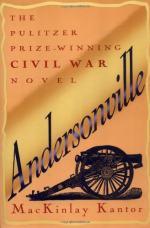All solicitations to accept a parole and go outside to work at one’s trade were treated with the scorn they deserved. If any mechanic yielded to them, the fact did not come under my notice. The usual reply to invitations of this kind was:
“No, Sir! By God, I’ll stay in here till I rot, and the maggots carry me out through the cracks in the Stockade, before I’ll so much as raise my little finger to help the infernal Confederacy, or Rebels, in any shape or form.”
In August a Macon shoemaker came in to get some of his trade to go back with him to work in the Confederate shoe factory. He prosecuted his search for these until he reached the center of the camp on the North Side, when some of the shoemakers who had gathered around him, apparently considering his propositions, seized him and threw him into a well. He was kept there a whole day, and only released when Wirz cut off the rations of the prison for that day, and announced that no more would be issued until the man was returned safe and sound to the gate.
The terrible crowding was somewhat ameliorated by the opening in July of an addition—six hundred feet long—to the North Side of the Stockade. This increased the room inside to twenty acres, giving about an acre to every one thousand seven hundred men,—a preposterously contracted area still. The new ground was not a hotbed of virulent poison like the olds however, and those who moved on to it had that much in their favor.
The palisades between the new and the old portions of the pen were left standing when the new portion was opened. We were still suffering a great deal of inconvenience from lack of wood. That night the standing timbers were attacked by thousands of prisoners armed with every species of a tool to cut wood, from a case-knife to an ax. They worked the live-long night with such energy that by morning not only every inch of the logs above ground had disappeared, but that below had been dug up, and there was not enough left of the eight hundred foot wall of twenty-five-foot logs to make a box of matches.
One afternoon—early in August—one of the violent rain storms common to that section sprung up, and in a little while the water was falling in torrents. The little creek running through the camp swelled up immensely, and swept out large gaps in the Stockade, both in the west and east sides. The Rebels noticed the breaches as soon as the prisoners. Two guns were fired from the Star Tort, and all the guards rushed out, and formed so as to prevent any egress, if one was attempted. Taken by surprise, we were not in a condition to profit by the opportunity until it was too late.




